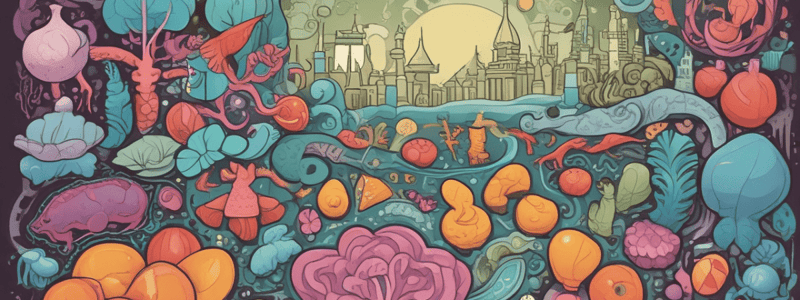Podcast
Questions and Answers
Milo of Croton, an ancient Greek Olympian wrestler, reportedly consumed about 10 pounds of meat daily.
Milo of Croton, an ancient Greek Olympian wrestler, reportedly consumed about 10 pounds of meat daily.
False (B)
Only animal foods are sources of protein.
Only animal foods are sources of protein.
False (B)
Proteins are chemically similar to lipids and carbohydrates due to the presence of nitrogen atoms.
Proteins are chemically similar to lipids and carbohydrates due to the presence of nitrogen atoms.
False (B)
Plants, animals, and bacteria contain only a few proteins.
Plants, animals, and bacteria contain only a few proteins.
Protein is the most valuable nutrient to your health.
Protein is the most valuable nutrient to your health.
Some nutrients can work independently in your body.
Some nutrients can work independently in your body.
The primary function of proteins in the body is to provide energy.
The primary function of proteins in the body is to provide energy.
Meat is the only rich source of protein.
Meat is the only rich source of protein.
There are more than 500,000 different proteins in the human body
There are more than 500,000 different proteins in the human body
Proteins are only responsible for muscle development and maintenance
Proteins are only responsible for muscle development and maintenance
All neurotransmitters are proteins
All neurotransmitters are proteins
Proteins are the primary source of energy for the body
Proteins are the primary source of energy for the body
Edema occurs when the level of protein in blood increases
Edema occurs when the level of protein in blood increases
Proteins help maintain a pH of 6.5 to 7.0 in body fluids
Proteins help maintain a pH of 6.5 to 7.0 in body fluids
Keratin is a contractile protein found in muscles
Keratin is a contractile protein found in muscles
Albumin is a type of enzyme
Albumin is a type of enzyme
Insulin and glucagon are two examples of proteins that function as neurotransmitters
Insulin and glucagon are two examples of proteins that function as neurotransmitters
Proteins play a role in maintaining fluid balance in the body by drawing fluid out of the bloodstream and into tissues
Proteins play a role in maintaining fluid balance in the body by drawing fluid out of the bloodstream and into tissues
The human body can synthesize all 20 amino acids necessary for protein production.
The human body can synthesize all 20 amino acids necessary for protein production.
Amino acids can act as buffers to maintain the normal pH of a solution.
Amino acids can act as buffers to maintain the normal pH of a solution.
The R group is the same for all amino acids.
The R group is the same for all amino acids.
The carbon skeleton of an amino acid is formed when the R group is removed.
The carbon skeleton of an amino acid is formed when the R group is removed.
Taurine is an essential amino acid for humans.
Taurine is an essential amino acid for humans.
Arginine is a nonessential amino acid.
Arginine is a nonessential amino acid.
Cysteine is always an essential amino acid.
Cysteine is always an essential amino acid.
Taurine has been scientifically proven to provide additional performance-related benefits for athletes.
Taurine has been scientifically proven to provide additional performance-related benefits for athletes.
Glutamine is an essential amino acid.
Glutamine is an essential amino acid.
The human liver can synthesize taurine in large amounts.
The human liver can synthesize taurine in large amounts.
Study Notes
What Are Proteins?
- Proteins are complex organic molecules that are chemically similar to lipids and carbohydrates, but they contain nitrogen, an element cells need to make important biological compounds.
- Proteins are the only macronutrient that contains nitrogen.
- Plants, animals, bacteria, and even viruses contain hundreds of proteins.
Functions of Proteins in the Body
- Proteins are necessary for muscle development and maintenance.
- Proteins have a wide variety of functions, including:
- Making or functioning as new cells and many components of cells
- Structures such as hair and nails
- Enzymes
- Lubricants
- Clotting compounds
- Antibodies
- Compounds that help maintain fluid and pH balance
- Certain hormones and neurotransmitters
- Energy source (minor, under usual conditions)
- Proteins are necessary for blood to clot properly.
- Proteins in the bloodstream transport nutrients and oxygen.
- Proteins help maintain the proper distribution of fluids in blood and body tissues.
Amino Acids
- Proteins are composed of smaller chemical units called amino acids.
- The human body contains proteins made from 20 different amino acids.
- Each amino acid has a carbon atom that anchors a hydrogen atom and three different groups of atoms: the amino or nitrogen-containing group, the R group, and the acid group.
Classification of Amino Acids
- Nutritionists classify amino acids as either nonessential or essential according to the body's ability to make them.
- Nonessential amino acids are those that the body can make.
- Essential amino acids are those that must be supplied by foods because the body cannot synthesize them or make enough to meet its needs.
- There are 9 essential amino acids and 11 nonessential amino acids.
- Some nonessential amino acids are "conditionally essential," which means they become essential in certain situations.
Studying That Suits You
Use AI to generate personalized quizzes and flashcards to suit your learning preferences.
Description
Learn about the primary functions of proteins in the body, their basic structural unit, and how to classify amino acids as essential or nonessential.




